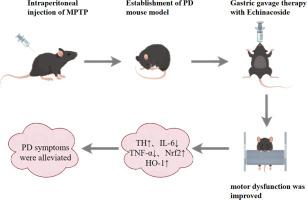棘白甙通过激活 NRF2/HO-1 通路对 MPTP 诱导的帕金森病小鼠模型的神经保护作用
Pharmacological Research - Modern Chinese Medicine
Pub Date : 2024-10-09
DOI:10.1016/j.prmcm.2024.100525
引用次数: 0
摘要
从肉苁蓉中提取的一种主要活性化合物--棘果苷,因其具有抗衰老、免疫调节、内分泌调节和神经保护作用而被传统中医学所认可。然而,棘白苷的具体神经保护机制在很大程度上仍不清楚。本研究旨在探讨在帕金森病(PD)小鼠模型中,棘果苷的神经保护作用是否是通过 Nrf2/HO-1 信号通路减轻炎症反应介导的。小鼠分为四组:对照组、模型组、阳性对照组和紫锥苷处理组。小鼠腹腔注射1-甲基-4-苯基-1,2,3,6-四氢吡啶(MPTP)一周后,口服棘果苷三周,诱发帕金森病模型。结果表明,紫锥栗苷能明显改善 MPTP 对帕金森病小鼠造成的运动功能损害。免疫组化分析表明,紫锥菊苷能增强酪氨酸羟化酶在帕金森病小鼠黑质中的表达。此外,炎症细胞因子的检测表明,棘白苷能有效降低脑组织中IL-6和TNF-α的水平。Western印迹分析进一步证实,棘果苷干预可提高帕金森病小鼠脑组织中Nrf2和HO-1的表达。这些研究结果表明,紫锥栗苷可能通过激活Nrf2/HO-1信号通路,在帕金森病小鼠模型中发挥神经保护作用。因此,棘果苷可被视为治疗帕金森病的一种潜在治疗策略。本文章由计算机程序翻译,如有差异,请以英文原文为准。

Neuroprotective effect of echinoside on MPTP-induced Parkinson's disease mouse model by activation of NRF2/HO-1 pathway
Echinacoside, a principal active compound derived from Cistanche deserticola Ma, is recognized in traditional Chinese medicine for its anti-aging, immunomodulatory, endocrine-regulating, and neuroprotective properties. However, the specific neuroprotective mechanisms of echinacoside remain largely unclear. This study aims to investigate whether the neuroprotective effects of echinacoside in a mouse model of Parkinson's disease (PD) are mediated through the Nrf2/HO-1 signaling pathway by mitigating inflammatory responses. Mice were divided into four groups: control, model, positive control, and echinacoside-treated groups. PD mouse model was induced through intraperitoneal injection of 1-methyl-4-phenyl-1,2,3,6-tetrahydropyridine (MPTP) over the course of one week, followed by three weeks of oral administration of echinacoside. The results demonstrated that echinacoside significantly improved motor function impairments caused by MPTP in PD mice. Immunohistochemical analysis revealed that echinacoside enhanced the expression of tyrosine hydroxylase in the substantia nigra of PD mice. Furthermore, assays of inflammatory cytokines indicated that echinacoside effectively reduced the levels of IL-6 and TNF-α in brain tissues. Western blot analysis further confirmed that echinacoside intervention upregulated the expression of Nrf2 and HO-1 in the brain tissues of PD mice. These findings suggest that echinacoside exerts neuroprotective effects in the PD mouse model, likely through the activation of the Nrf2/HO-1 signaling pathway. Therefore, echinacoside may be considered a potential therapeutic strategy for the treatment of PD.
求助全文
通过发布文献求助,成功后即可免费获取论文全文。
去求助

 求助内容:
求助内容: 应助结果提醒方式:
应助结果提醒方式:


